The Act recommends ways of treating the offender such that they are rehabilitated without the stigma of incarceration. Most states have first offender programs that apply to crimes that are not a risk to public safety or injurious to the victims.
In many states, if you complete a diversion program after your first offence, your record will be expunged. However, like any rule, there are exceptions. In certain states people who commit violent crimes or sex offences may be exempt from these programs. For example, according to criminal defense lawyer Randall B Isenbert of Fort Worth, in Texas DWI first offenders are exempted from diversion programs.
If you commit violent crimes, you can get jail time on your first offence, depending on the state. Sex offenders, those in possession of child pornography, and those involved in making child pornography are also often exempted from these programs.
Alternative sentencing
First offenders who are convicted of nonviolent crimes can be rehabilitated through alternative sentencing programs. These programs allow the offender to reform without utilizing prison resources. Alternative sentencing applies to misdemeanours where there was no grievous injury to the victim. Offences that are often punished through alternative sentencing include:
- Shoplifting
- Driving under the influence
- Simple battery
- Drug possession
You should ask your attorney if you qualify for an alternative sentencing program if you believe you may be a candidate based on your charge.
Probation
Probation involves assigning a probation officer to monitor the conduct of the offender for a certain period. The offenders must meet the officer at set times and undergo tests related to their offence. The court can revoke the probation if the convict violates the terms repeatedly.
You should ask your attorney if you qualify for an alternative sentencing program if you believe you may be a candidate based on your charge.
Suspended sentence
A suspended sentence is an incarceration order that is not imposed. Some suspended sentences have similar terms to probation, meaning that they can be activated if the offender repeats the offense within a given period. If the offender completes the sentence successfully, the court expunges it from their criminal record.
Fines
A fine is a monetary penalty that the offender pays at the sentencing court.
Community service involves ordering the convict to complete a task that is beneficial to the community. The tasks include collecting trash along highways, working at a soup kitchen, or volunteering for community organisations.
House arrest
A house arrest is a sentence where the offender serves time at home. In this case, the offender has an allowance to go to work and complete other essential tasks. However, they are under electronic surveillance, and they will get random visits by law enforcers and probation officers.
Restitution
Restitution involves compensating the victim for the losses they have incurred.
Deferred adjudication
Deferred adjudication refers to rehabilitation programs for offenders who commit misdemeanours that require specialised treatment. They give the offender a chance to show that they can improve their behavior if they undergo education and counseling.
DUI classes
These are classes that teach offenders about the risks of careless driving. They also educate them on the need to be responsible on the road and the effect of different substances on their ability to drive properly. Most programs take two to four hours of intense education.
[ymal]
Substance abuse programs
This class teaches offenders about the dangers of drug dependence and addiction. They also teach them resilience and how to curb the urge to indulge in substance abuse. Most classes take eight hours.
Domestic violence programs
These sessions educate offenders about the need to avoid violence when dealing with their spouses and family. The counselors challenge attitudes, beliefs, and traditions that promote violence and propose nonviolent alternatives. First offenders take 26 classes spread over six months.
Petty larceny classes
This program teaches offenders about the risk of theft and encourages them to live an honest life. The session lasts eight hours.
Impulse control programs
These classes teach offenders who lack self-control about the risk of injuring other members of the public. They train them about restraint and pursuing viable alternatives to impulsive behavior. The sessions take eight hours.
Prostitution prevention programs
This class teaches offenders on the legal and health risks of sex work. It also sensitises participants on the vulnerability associated with prostitution. Most classes take eight hours.
Deferred adjudication programs are a great way to avoid having your first offense end up on your permanent record. You’ll also want to ask your lawyer if deferred adjudication programs are a viable option for you.





















